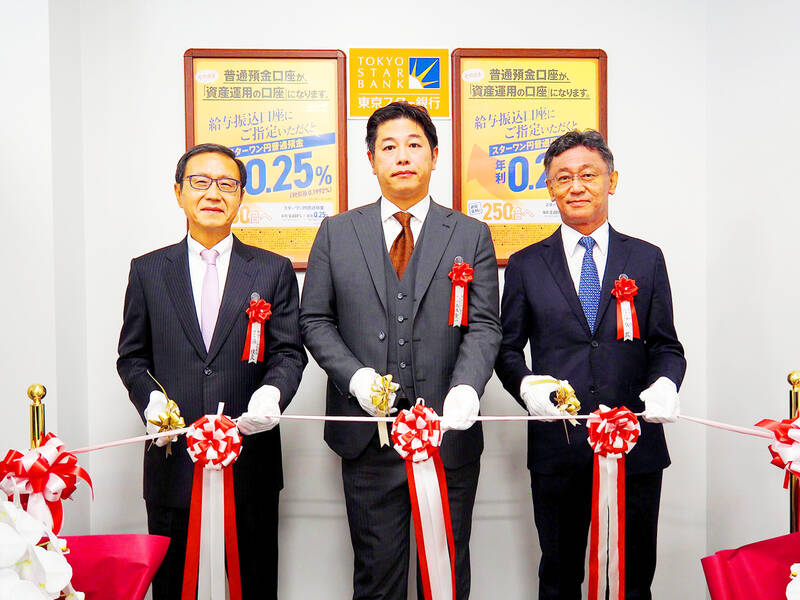CTBC Commercial Bank Co’s (中國信託銀行) Japanese subsidiary Tokyo Star Bank has launched an office in Kumamoto, targeting growing corporate loan and housing mortgage demand in the region with the arrival of Taiwan Semiconductor Manufacturing Co (TSMC, 台積電), CTBC said yesterday.
CTBC is the second Taiwanese bank to open a new branch on Japan’s western island of Kyushu. E.Sun Commercial Bank (玉山銀行) in September opened a branch in Fukuoka, which is less than an hour’s drive from Kumamoto.
Tokyo Star Bank is eyeing growing demand for loans and foreign exchange business for Taiwanese and Japanese suppliers of TSMC in Kumamoto, the bank said in a statement. The bank also set its sights on rising housing mortgage demand in the area, saying the real-estate market has been invigorated by the arrival of TSMC employees and semiconductor supply chain workers.

Photo courtesy of CTBC Commercial Bank
TSMC’s first fab in Kumamoto is scheduled to enter mass production late next year. The chipmaker has hired about 800 local employees to facilitate the fab’s operations.
“The launch of Tokyo Star Bank’s Kumamoto office aims to support the development of Taiwanese companies in the semiconductor chain in Japan and to provide consultancy services for Japanese companies’ deployment in Asia,” CTBC Bank president James Chen (陳佳文) said in the statement.
More than 35 TSMC suppliers are investing in Kumamoto or neighboring areas in Kyushu, as they want to stay close to the world’s largest contract chipmaker with immediate and quality services.
TSMC is planning to build a second fab, while speculation has emerged that a third plant is also under consideration.
Apart from CTBC and E.Sun, Taishin International Bank (台新銀行) and Chang Hwa Commercial Bank (彰化銀行) have also opened new branches in Kyushu.
In addition, Taishin plans to set up a new branch in Fukuoka and Chang Hwa is considering launching a branch in Osaka in the first quarter of next year, after both received approval from Japan’s Financial Services Agency last month.

The New Taiwan dollar is on the verge of overtaking the yuan as Asia’s best carry-trade target given its lower risk of interest-rate and currency volatility. A strategy of borrowing the New Taiwan dollar to invest in higher-yielding alternatives has generated the second-highest return over the past month among Asian currencies behind the yuan, based on the Sharpe ratio that measures risk-adjusted relative returns. The New Taiwan dollar may soon replace its Chinese peer as the region’s favored carry trade tool, analysts say, citing Beijing’s efforts to support the yuan that can create wild swings in borrowing costs. In contrast,

Nvidia Corp’s demand for advanced packaging from Taiwan Semiconductor Manufacturing Co (TSMC, 台積電) remains strong though the kind of technology it needs is changing, Nvidia CEO Jensen Huang (黃仁勳) said yesterday, after he was asked whether the company was cutting orders. Nvidia’s most advanced artificial intelligence (AI) chip, Blackwell, consists of multiple chips glued together using a complex chip-on-wafer-on-substrate (CoWoS) advanced packaging technology offered by TSMC, Nvidia’s main contract chipmaker. “As we move into Blackwell, we will use largely CoWoS-L. Of course, we’re still manufacturing Hopper, and Hopper will use CowoS-S. We will also transition the CoWoS-S capacity to CoWos-L,” Huang said

Nvidia Corp CEO Jensen Huang (黃仁勳) is expected to miss the inauguration of US president-elect Donald Trump on Monday, bucking a trend among high-profile US technology leaders. Huang is visiting East Asia this week, as he typically does around the time of the Lunar New Year, a person familiar with the situation said. He has never previously attended a US presidential inauguration, said the person, who asked not to be identified, because the plans have not been announced. That makes Nvidia an exception among the most valuable technology companies, most of which are sending cofounders or CEOs to the event. That includes

INDUSTRY LEADER: TSMC aims to continue outperforming the industry’s growth and makes 2025 another strong growth year, chairman and CEO C.C. Wei says Taiwan Semiconductor Manufacturing Co (TSMC, 台積電), a major chip supplier to Nvidia Corp and Apple Inc, yesterday said it aims to grow revenue by about 25 percent this year, driven by robust demand for artificial intelligence (AI) chips. That means TSMC would continue to outpace the foundry industry’s 10 percent annual growth this year based on the chipmaker’s estimate. The chipmaker expects revenue from AI-related chips to double this year, extending a three-fold increase last year. The growth would quicken over the next five years at a compound annual growth rate of 45 percent, fueled by strong demand for the high-performance computing